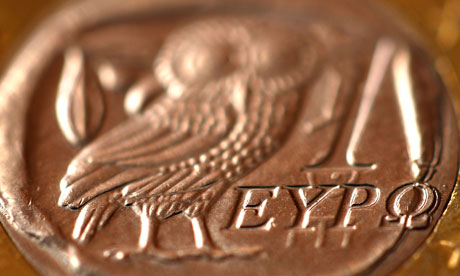Nikos Chrysoloras for Kathimerini, part of the Guardian Comment Network
guardian.co.uk, Wednesday 16 May 2012 15.07 BST
Printing a new currency while already bankrupt is suicidal – and the ensuing chaos would hurt the rest of Europe
A Greek one euro coin. Eurozone finance ministers are struggling to find a solution to Greece's pressing debt problems. Photograph: Vladimir Rys/Getty Images
It is striking that, when it comes to the European debt crisis, an ever increasing number of pundits, broadsheet press columnists and experts are in complete agreement with populists from the far left and the far right: the fiscal consolidation programme is self-defeating, they say, and Greece (and possibly other states in the periphery) should abandon the eurozone in order to regain their competitiveness. However, if there was one thing that the 2008 financial crisis should have taught us is not to trust the experts, especially since, in this case, they claim to know the remedy for a country which they have rarely, if ever, visited, and have no knowledge of its economic and social history.
So, although everyone is an expert on Greece these days, it seems that they have missed the fact that the country has tried the path they propose: expansionary fiscal policies, successive competitive devaluations, and the like. We've been there and done that during the 1980s. The result of the "miracle medicine" was average growth rate of 0.75% over the decade, average inflation at about 20%, interest rates at 33%, quadrupling of public debt and deficits of up to 16% of GDP. If that is the economic paradise of devaluations, thanks, but no thanks, I prefer the hell of austerity. Besides the fact that the younger generation has to pick up the bill for what happened in the 1980s, it is also worth mentioning that during the fiscal consolidation period that followed, in the years before the introduction of the euro, Greece enjoyed healthy growth rates, twice the EU average.
Hence, it is not reform that brought the economy to a standstill. On the contrary, the root of the crisis is the fact that Greece essentially ceased its efforts to reform after the adoption of the euro. Haunted by the stock market bubble of 1999 and exhausted by the continuous fights with trade unions, the Simitis government called it quits back then.
Growth continued to be strong though, since the public investment programme peaked ahead of the Olympics, while the sharp reduction of interest rates on government bonds and bank loans after the adoption of the euro kept the economy afloat. The international climate was also favourable for the powerhouses of the Greek economy (tourism and shipping) and tension in Greek-Turkish relations eased. Even more importantly, continuous pay rises in both the public and the private sector boosted consumption. Salary expenses in the Greek public sector increased by 117% between 1999 and 2009.
Moreover, if the experts were not sleeping during "Greek economic history 101" lectures in school, they would notice that the Greek economy went into recession not after the adoption of the economic adjustment programme in mid 2010, but well before that: immediately after the global 2008 financial crisis, which signalled the end of cheap and easily available credit. In 2009, Greece ran a huge public deficit (15.6% of GDP) in order to avert a recession, but failed to do so (GDP contracted by 3.2%). So we tried to spend our way out of recession and again, just like in the 1980s, it did not work.
And although it is true that austerity suppresses economic output, Greece's main problem is not austerity, but uncertainty. It should have been clear that no matter how much wages drop, and no matter how good opportunities present, no one will invest in the Greek economy and create jobs, if they are not certain about what will happen in the country. For as long as Greeks and Europeans alike do not provide a definitive and convincing answer to the question of whether Greece will remain part of the eurozone and the EU, GDP will keep contracting and unemployment will be rising.
The drachma will not solve any of the problems of the Greek economy, namely, public finance mismanagement, over-reliance on public and private consumption, lack of medium and large export-oriented enterprises, extremely high percentage of self-employed professionals, low competitiveness, tax evasion, and unbelievably weak administrative capacity.
To the contrary, we should bear in mind that Greece will not devalue an existing currency, because the drachma does not exist. It will introduce a new currency, while already being in a state of default. Leaving aside the logistics of such an endeavour, printing a new currency while already bankrupt is a suicidal move, since no one will want to buy it.
Unlike Argentina, Greece is not a net exporter of raw materials. Hence, it will have no means to support the new currency, which will have no exchange value. The country will be unable to pay in order to import oil, gas, food, and medicines with drachmas. Chaos will ensue and uncertainty will spread to the rest of the eurozone.
Strange as it may sound, what we are going through in Greece, is the best of all possible worlds. Restoring the competitiveness of the Greek economy and changing its structure is the only way for the country to survive in the absence of cheap credit.
The gigantic support programme by the EU and the IMF can only help Greece escape a crash. But the hard landing cannot be avoided. In a sense, Greece now finds itself in "the desert of the real", as its standards of living are adapting to a world without loans, and reflect the actual production of wealth in the country. Staying in the eurozone and pursuing reform is the only chance Greece has. Hopefully, everyone will realise it before descending into chaos.
Greece must remain in the eurozone | Nikos Chrysoloras | Comment is free | guardian.co.uk
![The [Greek] European Tragedy](https://blogger.googleusercontent.com/img/b/R29vZ2xl/AVvXsEiWKI5s90SFm1wWTk6bs4p7CgslaC2SnYPsrZhb-B-smOufNNCSxCvpBLI9hOB-LsXZjir_PNmEiMk2-E62F3xkg96IoC6QFAaZAnPRTVH340IN9WBRmWJqPkjWlgyRj3zpALp7h6hvA58/s920/GkBack_new.jpg)

